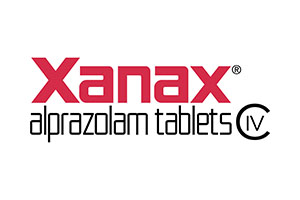Medication for anxiety can relieve anxious feelings, reduce the frequency and severity of panic attacks, and produce a sense of calm where there was agitation.
Millions of Americans use these medications on a daily basis to deal with general anxiety, panic attacks, various phobias, PTSD, obsessive-compulsive disorder, and more.
If you believe anxiety is interfering with your day-to-day life, consult your doctor or mental health professional to find out if anxiety medication is right for you.
Below is our list of the best medications for anxiety updated for 2023.
Rankings
1. Prozac

Prozac (fluoxetine) has been overtaken sales-wise by some other anxiety medications in recent years. Yet that does not diminish the high marks it still earns for its effectiveness in treating panic attacks, OCD, and more.
What we like: Prozac has a proven track record for treating anxiety disorders. It has helped millions purge unwanted thoughts, reduce fear, and mitigate the urges behind compulsive behavior.
Flaws: Prozac should not be used by those with a history of bipolar disorder or those with liver problems or diabetes.
2. Zoloft

Zoloft (sertraline) is used by countless individuals to treat their OCD, panic attacks, PTSD, social anxiety, and more. It does a generally reliable job relieving anxiety, reducing the number and severity of panic attacks, and fending off OCD episodes.
What we like: Zoloft has a well-deserved record for addressing the worst aspects of general anxiety disorder and for preventing panic attacks. It is well tolerated by most people, with serious side effects being rare.
Flaws: While extremely rare, sertraline has been known to produce a heart rhythm anomaly called QT prolongation.
3. Xanax

Xanax (alprazolam) is mostly used to treat general anxiety disorder and panic disorders. Although, on occasion, it might be deemed appropriate for other types of anxiety. Xanax is a benzodiazepine and is available in liquid or tablet form.
What we like: The fact that it is available in multiple forms is a plus. Xanax has a nearly 40-year record of providing effective relief for general anxiety disorder. In some cases, it may be used to treat patients with both anxiety and depression.
Flaws: Xanax has been known to produce dizziness in some patients. Also, cannabis use may exacerbate side effects.
4. Paxil

Paxil (paroxetine) is a selective serotonin reuptake inhibitor (SSRI) used to treat everything from general anxiety disorders to various phobias. It works by increasing serotonin in the brain, which improves mood and reduces anxiety.
What we like: Paxil is a generally effective, low-impact SSRI medication with a strong track record. It is particularly effective against panic attacks. Any side effects individuals experience from Paxil are usually mild.
Flaws: You should not smoke marijuana while taking this medication. Also, it may cause some drowsiness, so no operating heavy machinery either.
5. Lexapro

Lexapro (escitalopram) is used primarily to treat general anxiety disorders that have persisted for at least six months. Like several others on this list, it is an SSRI and works by tricking the brain into producing more serotonin.
What we like: Lexapro does a good job alleviating moderate to severe anxiety, and reducing intensity and frequency of panic attacks. Many have noted that it also does a good job reducing feelings of anger, while promoting deep, restful sleep.
Flaws: It has been known to negatively impact sex drive. And it may produce dizziness in some.
6. Klonopin

Klonopin (clonazepam) is widely used to control seizures. But it also reduces the severity and frequency of panic attacks, and is effective in treating social anxiety disorder. As a benzodiazepine, it goes to work fast.
What we like: As is the case with all benzodiazepines, you will not have to wait long to feel the effects of Klonopin. It is one of the most effective anxiety medications for panic attacks and quickly produces a feeling of calm.
Flaws: Dizziness is a fairly common side effect. As such, it may not be appropriate for older individuals.
7. Valium

Valium (diazepam) has a history that goes back nearly 60 years. A product of Swiss drugmaker Roache, Valium was the first drug to reach $1 billion in sales. Today it is used for everything from general anxiety to alcohol withdrawal.
What we like: Valium works fast to alleviate anxiety, reduce the severity of panic attacks, and produce feelings of emotional tranquility. Valium is a benzodiazepine and has proven itself useful in promoting a good night’s sleep.
Flaws: There have been rare instances where patients have claimed Valium has produced hallucinations. It is also potentially addictive.
8. Ativan

Ativan (lorazepam) is another benzodiazepine that works by calming the nerves. It produces euphoria by enhancing the effect of the neurotransmitter GABA. By doing so, it prevents anxiety from rising to troublesome levels.
What we like: Ativan does an admirable job reducing panic attacks. When taken as directed by otherwise healthy individuals, side effects are manageable and far outweighed by the benefits.
Flaws: Ativan may cause drowsiness. As such, you should not drive, drink alcohol, or smoke marijuana while taking it.
9. Effexor

Effexor (venlafaxine) is an SNRI that works by increasing the amounts of serotonin and norepinephrine in the brain. Effexor is typically used to treat general anxiety disorder, social anxiety disorder, and certain phobias.
What we like: Effexor is a long term treatment for less immediate needs. It generally produces an easy feeling and effectively takes the edge off of angry feelings, impatience, and restlessness.
Flaws: You should avoid aspirin when taking Effexor. And it may produce a severe interaction with MAO inhibitors.
10. Celexa

Celexa (citalopram), has quietly become one of the most prescribed anxiety medications on the market. It is an SSRI that works by restoring serotonin balance in the brain. It needs to be taken on a regular basis to be truly effective.
What we like: Once Celexa reaches critical mass in your bloodstream, it does an outstanding job of helping you maintain an even compass. Side effects are also typically quite manageable.
Flaws: Although not common, this medication may cause an irregular heartbeat, dizziness, and fainting.
Who Needs Medication For Anxiety?
Feeling anxious now and then is part of life. It is a component of the body’s natural self-defense system and linked closely with the fight or flight response. But there is a difference between feeling anxious prior to performing in front of a crowd, and being afraid to leave your house because you might encounter people outside. Just as there is a difference between jiggling the doorknob once as you leave your home to make sure it is locked, and checking the doorknob two dozen times.
Essentially, anyone who suffers from an anxiety disorder is a potential candidate for anxiety medication. But, just because someone might benefit from anxiety medication, it does not mean they necessarily should take one. They may be served just as effectively by a combination of psychotherapy and exercise. The most important thing is that the decision to use an anxiety medication is arrived at only after careful consultation with your doctor.
How We Ranked
Ranking anxiety medications is an inexact science due to the range of divergent opinions regarding their efficacy and applicability. The fact is, many therapists are extremely reluctant to prescribe anxiety medications, preferring, instead, to try and unmask and treat the root cause. While in other instances, some doctors and psychotherapists will prescribe first and ask questions later. That approach stresses bringing the problem under control before trying to treat any underlying causes.
So who is right? At this point, it is nearly impossible to say. All that can be said with any certainty is that it is best to use a multi-pronged approach when treating anxiety disorders. That typically means therapy, exercise, and, perhaps, medication. Otherwise, at the end of the medication cycle, the underlying causes will still be there.
All that said, the general consensus as of this writing is that SSRIs (Selective Serotonin Reuptake Inhibitors) and SNRIs (serotonin norepinephrine reuptake inhibitors) represent the current cream of the crop. SSRIs include Prozac, Zoloft, Celexa, and others. SNRIs include Effexor and Savella. Both are commonly prescribed for those suffering from general anxiety disorder (GAD), panic disorders, and obsessive-compulsive disorder, or OCD.
Finally, benzodiazepines are often used to treat social anxiety disorder and panic disorders. Benzodiazepines include Valium and Xanax. For the most part, these no longer enjoy the favored status they once did. That is mainly due to the elevated risk of addiction they present, compared to SSRIs and SNRIs. They are still in common use, however.
At the end of the day, we let the results of our research into the current thinking of mental health professionals guide our rankings.
FAQs
Q: What causes anxiety disorders?
A: The exact cause of anxiety disorders will often vary from person to person. Genetics may play a role. Or it may be a result of learned behavior or personal experience. Military personnel often suffer from PTSD as a result of wartime trauma. Anxiety disorders may also appear as a symptom of other mental health issues. In some instances, however, there may be no apparent cause.
Q: Isn’t anxiety normal?
A: Anxiety and fear are indeed considered normal responses in some situations (1). For instance, few are the people who do not feel some butterflies before speaking to a crowd. And, if there is a legitimate threat at hand (say, someone pointing a gun at you), fear is a completely normal response. Anxiety only becomes a problem when it interferes with a person’s ability to live their life, do their job, or maintain relationships.
Q: Is medication the answer for anxiety?
A: Medication may be part of the answer for anxiety. But it is often recommended that a person also engages in psychotherapy and exercise (2). In fact, many doctors recommend a person try exercising before they will prescribe medication. Exercise releases muscle tension that can contribute to anxiety. It gets oxygen flowing to the brain that can elevate mood, and it releases the feel-good hormone serotonin (3).
Q: Do all anxiety medications treat all types of anxiety?
A: No. Anxiety medications are not one-size-fits-all drugs. Just because a certain medication works to relieve PTSD symptoms, it does not mean it will also alleviate anxiety related to fear of heights. Or that you can use it to treat obsessive-compulsive disorder (4). It is vital that you work with your doctor to find the right anxiety medication for your particular situation. And that you avoid ‘sharing’ anxiety medications with others.
Q: Are there different kinds of medication for anxiety?
A: There are several different kinds of anxiety medication. They include SSRIs, SNRIs, beta-blockers, and some antidepressants. Each of these medications work in different ways. SSRIs block reabsorption of serotonin in the brain, which increases the amount of serotonin available. SNRIs do the same but also block norepinephrine. Beta-blockers work by stunting the effects of adrenaline, while antidepressants work in much the same way as SSRIs.
Q: Are medications for anxiety addictive?
A: In the past, when opioids (5) were often prescribed for anxiety disorders, addiction was an all too common outcome. Today, opioids are reserved for only the most severe cases. And even then, their use is strictly controlled. That said, anxiety medications need to be dispensed carefully because some are capable of creating a euphoric feeling that may prove problematic for some individuals.
Q: Do anxiety medications produce the same results for everyone?
A: Unfortunately, a particular anxiety medication may produce very different results in different people. A medication that works fine for Person A may not work for Person B else. Or, Person B may need to combine it with another medication to enjoy the benefits. The fact is, mental health professionals do not know why a particular drug will work for one person but will not work for another.
Q: Will Medicare pay for my anxiety medication?
A: As long as you are 65 and enrolled in Medicare, and you have opted for Medicare Advantage plan (6), Medicare should cover the cost of your anxiety medication. That is, as long as you have a prescription from a qualified doctor. For the record, most private health insurance plans will also cover anxiety medication, as long as it is prescribed by a qualified mental health professional.
Q: Should people with a history of substance abuse use medication for anxiety?
A: While today’s anxiety medications typically present a low risk of addiction, the possibility is nonetheless there. As such, those with a history of drug or alcohol addiction should discuss the matter thoroughly with a mental health professional before deciding whether to take anxiety medications. Remember, there are other non-medical options for treating anxiety, including psychotherapy (7) and exercise.
Q: What are SSRIs?
A: SSRI stands for Selective Serotonin Reuptake Inhibitors. This class of medications works to prevent the hormone serotonin from being reabsorbed by the brain. By denying reabsorption, the brain is forced to produce more serotonin that, in turn, helps reduce anxiety. Prozac and Celexa are popular SSRIs. While SSRIs are considered non-addictive, they can produce drowsiness, sexual dysfunction, and other side effects in some people.
Q: Are anxiety and phobia the same thing?
A: While they may share some similarities in the way they physically manifest, anxiety and phobia are not the same. Anxiety is a feeling of intense apprehension that may be all-encompassing or may arise when a person is faced with a stressful or awkward situation. Phobias, by comparison, produce an overwhelming fear of a specific thing or event, such as heights, spiders, elevators, large gatherings, and airplanes.
Q: Can anxiety disorders be cured?
A: Permanent recovery from anxiety disorders is possible (8). But it is rarely as simple as taking a certain medication for a few months. It is also important to keep in mind that anxious feelings are a natural part of our natural defense system. As such, even if someone has recovered from a certain type of anxiety disorder, they will still be susceptible to anxious feelings from time to time.
Q: How do I know if I need medication for my anxiety?
A: You will need to see a qualified mental health professional and receive a proper diagnosis. Anxiety disorders are not like headaches. They cannot be self-diagnosed. If you believe anxiety is interfering with your ability to live a normal life, you should make an appointment and discuss the situation with a doctor. Even then, other therapeutic options should be discussed before the decision is made to use anxiety medications.
Q: What are SNRIs?
A: SNRI stands for Serotonin and Norepinephrine Reuptake Inhibitors (9). SNRIs are a class of medications that boost serotonin while also regulating the neurotransmitter norepinephrine (10). SNRIs are mostly used to treat depression. But they are also prescribed for generalized anxiety, and to a lesser extent, panic disorders. Side effects from SNRIs may include fatigue, constipation, and loss of appetite.
Q: Is there a downside to medications for anxiety?
A: Any downside to anxiety medication must be weighed against the potential benefits. Certainly, you cannot ignore the possibility (or reality) of side effects. But if you are experiencing genuine relief from your anxiety, the side effects (if any) will probably be worth it. Another potential downside has to do with expectations. If you expect the medication to cure you of your anxiety quickly, you are setting yourself up for disappointment.
Q: Are there alternatives to medication for anxiety?
A: It is rarely advisable to try and treat anxiety with medication alone. Most people should also consider engaging in cognitive behavioral therapy (11) as well. That is because anxiety often has complex mental and emotional roots. Medications, useful as they may be at treating symptoms, are not able to address those root causes. And if you hope to transcend your anxiety, you will need to address them.
Q: Are medication for anxiety safe?
A: Anxiety medications are generally safe and effective. They have little impact on vital organs or bodily functions. While side effects such as fatigue and trouble concentrating are possible, many people experience few or no adverse effects. That said, the longer you use some anxiety medications, the less effective they will become. And, to avoid withdrawal symptoms, you should not abruptly stop taking them.
Q: What is a beta blocker?
A: A beta-blocker is a type of medication commonly used to treat hypertension (12) and circulatory problems. On occasion, doctors may prescribe them to deal with certain symptoms of anxiety, such as rapid heart rate and shaking. That is because they can block the effects of adrenaline (13) and epinephrine (14). As a general rule, however, they are not considered to be true anxiety medications per se.
Q: Are there different kinds of anxiety disorders?
A: There are five generally recognized categories of anxiety disorders. They are Generalized Anxiety, phobias, panic disorders, Post Traumatic Stress Disorder (PTSD), and obsessive-compulsive disorders. In some cases, it can be difficult to discern exactly which category a person’s symptoms may belong to. As such, it is vital that you discuss the matter with your doctor to get a proper diagnosis and the proper medication.
Q: Will I need anxiety medication for the rest of my life?
A: It is typically not constructive to think about things in such a way. A better approach, according to mental health professionals, is to deal with the current situation, develop a treatment approach with your doctor, and see how things go. It is possible that you may transcend the anxiety disorder in time. Keeping a positive attitude (15) can go a long way toward ensuring that happens.
Q: Can anxiety cause a migraine headache?
A: Anxiety can and often does trigger a migraine in people who suffer them. It can sometimes go the other way too. That is, worrying about a migraine can trigger anxiety, which in turn triggers a migraine (16). If you suffer from migraines, it is highly recommended that you try and avoid situations that cause undue stress or anxiety. Also, if you suffer from some form of anxiety disorder, medication may help to relieve the anxiety and prevent it from becoming a trigger.
Related Articles
Supplements for anxiety
CBD oil for anxiety
Recap
Anxiety disorders are vexing conditions that often evade simple treatment or quick resolution. Their potential causes are many and complex and may include personal trauma, learned behavior, genetics, or any of numerous other possibilities.
Anxiety medications have come a long way since the days when patients were routinely given morphine or other opioids. Today’s anxiety medications are largely non-addictive, target specific aspects of brain activity, and cause only mild or no side effects in many people.
The information above is presented for informational purposes only and should not be considered medical advice. If you feel that anxiety is interfering with your life in a substantive way, you should seek the help of a qualified mental health professional as soon as possible.
For information on cpoe.org’s #1 recommended anxiety medication, click here.

